British Rail Class 319
| British Rail Class 319 | |
|---|---|
 Govia Thameslink Railway 319373 and 319438 in July 2015 | |
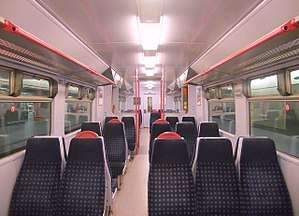 The refurbished interior of Govia Thameslink Railway's 319008 | |
| In service | 1987-current |
| Manufacturer | British Rail Engineering Limited[1] |
| Order no. |
|
| Built at | BREL York |
| Family name | BR Second Generation (Mark 3) |
| Replaced | Class 321 |
| Constructed | 1987–88, 1990[3] |
| Entered service | 1987-1990 |
| Number built | 86 units |
| Number in service | 85 units (1 converted to Class 769) |
| Formation |
|
| Diagram |
|
| Fleet numbers |
|
| Capacity |
|
| Operator(s) | |
| Depot(s) | |
| Line(s) served | |
| Specifications | |
| Car body construction | Steel[4] |
| Car length | |
| Width | 2.82 m (9 ft 3 in)[1] |
| Height | 3.58 m (11 ft 9 in)[1] |
| Doors | Bi-parting sliding,[3] emergency end doors[3] |
| Wheelbase | 14.170 m (46.49 ft)[4] |
| Maximum speed | 100 mph (161 km/h)[1][3] |
| Weight | 140.3 t (138.1 long tons; 154.7 short tons)[1] |
| Axle load |
|
| Traction motors | 4 × GEC G315BZ[3] |
| Power output | 4 × 247.5 kW (331.9 hp)[2] |
| Train heating | Electric[4] |
| Electric system(s) | |
| Current collection method |
|
| UIC classification | 2'2'+Bo'Bo'+2'2'+2'2' |
| Bogies | |
| Braking system(s) | Westinghouse 3 step friction brake,[1] disc,[2] air (Westcode)[3] |
| Safety system(s) | |
| Coupling system | Tightlock |
| Multiple working | |
| Headlight type | Fluorescent[4] |
| Track gauge | 1,435 mm (4 ft 8 1⁄2 in) standard gauge |
The British Rail Class 319 is a dual-voltage electric multiple unit train capable of operating on 25 kV AC from overhead wires or 750 V DC from a third rail. They were built by BREL York for use on north-south cross-London services.
Built in two batches in 1987–88 and 1990, the units were primarily used on the then-new Thameslink service operating from Bedford to Brighton and various other destinations south of London. The majority of the fleet remained in use on the Thameslink route after its reshaping and privatisation in 1997. Some of the fleet was also used on various other services operating out of London Victoria, including flagship expresses to Brighton.
Since delivery of new Class 700 rolling stock for Thameslink services commenced in 2015, the Class 319 units have been redeployed for use on other operators' services, including in the North West of England.
It is envisaged that at least 35 Class 319 units will be converted to bi-mode Class 769 units for use on routes which are partly electrified.
Description
.jpg)
In the 1980s, there were plans for a rail service that would link Bedford and Brighton. This became the first passenger route for many years to cross London from north to south, and was branded Thameslink by Network SouthEast, which operated it.
As the Thameslink service was to use a route with 25 kV AC OHLE north of Farringdon and along the branch to Moorgate, and 750 V DC third-rail electrification south of Farringdon, the Class 319 trains were built with dual-voltage capabilities, making them very versatile.[6] They were also the first British Rail units to use modern thyristor control in place of a camshaft and resistor bank.[7]
The body shape of the Class 319 is slightly different from contemporary electric units due to restrictions in the loading gauge in Kings Cross tunnel, which meant that other dual-voltage units were not suitable. They were also required to have emergency end doors in the cabs,[8] due to the twin single-bore layout of Smithfield tunnel preventing normal train evacuation.
Two sub-classes of Class 319 units, 60 Class 319/0s and 26 Class 319/1s, were originally built.[9] Over the years, units have been refurbished, creating five sub-classes, of which four still exist.
Class 321 passenger units and Class 325 postal units were developed from the Class 319 design,[7] using similar traction equipment and the same steel body design, with revised cab designs.
Class 319/0
The first batch of 60 units, built in 1987–88, was classified as Class 319/0. Units were numbered in the range 319001–060 and had a maximum speed of 100 mph (161 km/h). Each unit consisted of four steel carriages: two outer driving trailers, an intermediate motor with a roof-mounted Stone Faiveley AMBR pantograph and four DC GEC G315BZ traction motors (two per bogie), and an intermediate trailer housing a compressor, motor alternator and two toilets. Seating was standard-class only, in 2+3 layout.
The technical description of the unit formation is DTSO(A)+MSO+TSO+DTSO(B). Individual vehicles were numbered as follows:
- 77291–77381 (odd) and 77431–77457 (odd) — DTSO(A)
- 62891–62936 and 62961–62974 — MSO
- 71772–71817 and 71866–71879 — TSO
- 77290–77380 (even) and 77430–77456 (even) — DTSO(B)
Vehicles were numbered in two ranges, corresponding to units 319001–046 and 319047–060. The gaps in the number series (e.g. 77382–77429) were filled by the Class 442 units, built around the same period.
DTSO(B) originally featured a lockable sliding door between the driving cab and the first set of power doors and tip-up longitudinal seating to enable parcels to be carried securely. This facility was rarely used and the sliding door has since been removed.
Units 319001–013 are the remaining members of the 319/0 subclass; all others were converted to Class 319/2 or Class 319/4 in the late 1990s.
Class 319/1
Built in 1990, this second batch of 26 units was numbered in the range 319161–186. The formation of the second batch of sets was similar to that of the earlier units, with the addition of first-class seating at one end of the train for use on longer-distance Bedford to Brighton services.[6] Like the first batch, standard-class seating was of a 2+3 layout in standard class. First-class seating was in 2+2 layout.
Units were formed in the arrangement DTCO+MSO+TSO+DTSO. Individual vehicles were numbered as follows:
- 77459–77497 (odd) and 77973–77983 (odd) — DTCO
- 63043–63062 and 63093–63098 — MSO
- 71929–71948 and 71979–71984 — TSO
- 77458–77496 (even) and 77972–77984 (even) — DTSO
Vehicles were numbered in two ranges, corresponding to units 319161–180 and 319181–186. A more modern Brecknell Willis high speed pantograph was also fitted.
All 319/1 units were converted to Class 319/3 in the late 1990s.
Class 319/2
In the late 1990s, seven of the Class 319/0 sets were converted especially for use on Connex South Central express services between London Victoria and Brighton.[10] Work carried out at Railcare Wolverton included new, lower-density seating, a disabled toilet, and a special 'lounge' seating area in the saloon space below the pantograph in the MSO, where stowage for a refreshment trolley and a small serving counter were also fitted.
Units involved were renumbered from the series 319014–020 to 319214–220. They retain their low-density layout, but the lounge area has been replaced by standard seating since their return to use on Thameslink services.
Class 319/3
In the period 1997-99,[10] Thameslink arranged for all of its 319/1 units to be converted at Eastleigh Works for use on the shorter-distance Luton to Sutton/Wimbledon services, then known as 'Thameslink CityMetro'. These units lost their first-class seating and were renumbered into the 319/3 series. They were painted in a navy-blue and yellow livery at this time.
Various refurbishments have taken place since 1999, including:
- Minor refresh by Thameslink including new seat covers between 2003 and 2005
- Relivery and interior refresh by Railcare Wolverton for First Capital Connect completed in 2010
- New passenger information system, new seat covers and an internal and external repaint for units transferring to Northern Rail and similar work for those remaining on Thameslink in the interim, starting in 2014.
Class 319/4
Units 319021-060 were refurbished for Thameslink at Railcare Wolverton in 1997/98. Work included the installation of a first-class compartment at one end, in the DTSO(A) vehicle[10] and the removal of some seating in the centre of each vehicle to give 2+2 layout. Cosmetic improvements included new carpets and seat coverings, as well as application of the navy-blue Thameslink livery.
Upon completion, these units were renumbered as 319421-460 and moved on to the Bedford to Brighton service, branded as 'Thameslink Cityflier'.
From 2003 to 2005, during the Thameslink blockade, some minor interior updating took place such as recovering seats with an updated Thameslink moquette. First-class compartments were refurbished with new carpet, retrimmed seats and chrome-plated heater panels, apart from unit 319444, which retained its 1997-designed interior.
A later refresh was unveiled by the then new operator First Capital Connect on 26 October 2006. Unit 319425 was renamed Transforming Travel for the occasion and showcased the following improvements:
- Emergency brake pressure increased to the +12% G standard, giving an extra 1 Bar brake cylinder pressure in emergency
- Emergency brake 'timeout' period reduced from 2 minutes to 20 seconds
- DC traction motors rewound to improve reliability
- Improved motor control hardware with a new Remote Communications Frame
- New 'easy to clean' flooring
- Retrimmed seats into the First Capital Connect moquette
- Some seats in standard class were removed and vertical luggage stacks installed in their place; a further two seats were removed in the TSO vehicle to allow easier access to the toilet
- Repainted dado side panels and wall ends
- Existing stanchions painted pink
- New stanchions leading from some seats to the overhead luggage rack to provide standing passengers with something to hold on to and more support
- Improved, brighter fluorescent lighting diffusers
The refresh took place at Railcare Wolverton works and also featured both a mechanical overhaul (under the solebar) and a full exterior relivery, again in vinyl. Some Class 319/4 units have had their Stone Faiveley AMBR air and spring pantograph replaced by the more modern Brecknell Willis High Speed air-only pantograph design.
Current operations
After the withdrawal of the final six Class 319 units from the Thameslink network on 27 August 2017, less than half of the original Class 319 fleet is currently in service, with the majority currently in storage at Long Marston. 35 units (25 319/3s and ten 319/4s) are currently allocated to Northern, with their 319/4 units due to be converted to Class 769 Flex bi-mode units by 2018. West Midlands Trains is the only other operator of the Class 319, with two 319/0, two 319/2 and five 319/4 units currently on fleet.
Northern
To operate on newly electrified routes in the North West of England, Northern Rail received twenty Class 319/3 units after they were replaced by brand new Class 387 units. The first Northern Rail service to be operated by Class 319s was the Liverpool Lime Street to Manchester Airport via Chat Moss service on 5 March 2015.[11] From 17 May 2015, the Liverpool Lime Street to Wigan North Western via Huyton route followed suit.[12]
The first batch of units which transferred to Northern Rail underwent a light refurbishment at Wolverton works and were repainted into a dedicated Northern Electrics livery, although all of these units had been repainted into Northern's livery by mid 2018. The 750 V direct current (DC) third rail equipment was also removed..
Other services now operated by Class 319s include Manchester Victoria to Liverpool via Earlestown, Liverpool to Warrington Bank Quay and Liverpool to Preston. In April 2016, these units transferred to new franchise operator Northern, who have since leased an additional fifteen Class 319s to operate on newly electrified services from Blackpool North, with these commencing in May 2018.
In December 2016, it was announced that Northern's allocation of 319/4s are to be converted to Class 769 Flex bi-mode multiple units by Brush Traction at Loughborough,[13] with the remaining 319/3s due to operate on existing and future electrified services.
West Midlands Trains
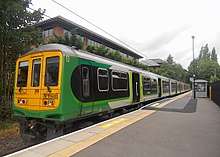
Seven units were transferred to London Midland in 2015 to operate the Watford Junction to St Albans service and some peak West Coast Main Line services out of London Euston.[14] These replaced the seven Class 321 units that transferred to Abellio ScotRail.[15][16] In April 2017, one of the five Class 319/4 units, 319455, was swapped for 319433, with the latter receiving a light refresh and a repaint before entering service.
In December 2017, West Midlands Trains (a consortium of Abellio, JR East and Mitsui) took over the operation of the West Midlands rail franchise, with the seven Class 319 units initially leased by London Midland transferring to the new operator.
A week after the start of the new franchise, West Midlands Trains leased additional Class 319 units, enabling the company to take their Class 350/1 and 350/3 Desiro units out of service for their planned refurbishment[17].
West Midlands Trains' allocation of Class 319s will be replaced during the current franchise.
Former operations
Thameslink
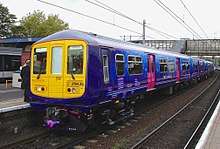
With the first units entering service for Thameslink in 1987, Class 319s were a mainstay on the Thameslink network for almost three decades. In early 2015, the first batch of units were withdrawn from the network after being displaced by Class 387 units.
Twenty Class 319/3s transferred to Northern Rail for newly electrified lines in the North West, with the first units entering service in March 2015 after a light refurbishment. A further seven units left the network in 2015, transferring to London Midland to replace their Class 321 units, which had transferred to Abellio ScotRail.
Since the introduction of the new Class 700 units in June 2016, Class 319s departed the network as new trains have entered service. A further batch of twelve units transferred to the North West of England for service with Northern, with the remainder being placed into storage at Long Marston. The six remaining Class 319 units were withdrawn from Thameslink service on 27 August 2017, around 30 years after their initial introduction to service.[18]
Since their withdrawal, a number of additional units have been allocated to Northern and West Midlands Trains to boost capacity.
Southern
When British Rail was privatised in the mid-1990s, the first 13 units (319001–013) were used for outer-suburban services by Connex South Central, with some temporarily losing their 25 kV AC overhead equipment.
Seven more of the Class 319/0 sets (319014–020) were refurbished and dedicated to express services between London Victoria and Brighton,[10] before later finding work on peak-only London Victoria to Guildford via West Croydon and London Victoria to Horsham via Three Bridges services. The dual-voltage capability was also used to introduce new services linking Rugby and Gatwick Airport[19] via the West Coast and West London Lines in the 1990s.
Successor company Southern continued to operate the fleet and reliveried it into its own colour scheme. It later went on to sublease Class 319/0 units to First Capital Connect for use on the Thameslink route, before eventually releasing the entire fleet.
Notable units
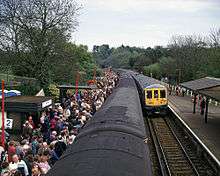
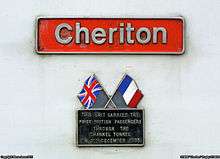
Units 319008 Cheriton and 319009 Coquelles are notable for two reasons:
- On 10 December 1993, they travelled through the Channel Tunnel to Calais-Fréthun and back with a party of invited guests, after the construction consortium TransManche Link (who were responsible for the construction of the Tunnel) had transferred responsibility for operations and management over to Eurotunnel. Their pantographs were modified at Selhurst Depot beforehand to account for the higher OHL height at Cheriton and in the tunnel. For the subsequent "Folkestone 1994" event on 7 May 1994, which saw the first paying members of the public taken into the tunnel by train. On 26 March 1994 units 319008 and 319009 were named Cheriton and Coquelles respectively at Victoria and plaques adorned with the Union Flag and Tricolore were installed on their motor carriages.[10][20]
- On 26 March 1994, they set a record for the shortest London to Brighton journey time, at 37 minutes 57 seconds. This record stood until 2005 when the "Speed Run" event, organised by Southern, using Class 377 units 377 472 and 377 474 set a slightly quicker record of 36 minutes 56 seconds.[21] Both units had their nameplates removed after being transferred from Southern to First Capital Connect. In 2012 319008 Cheriton was noted with its nameplates re-applied, and on 5 March 2012 319009 Coquelles was also re-united with its nameplates.
Named units
Named units are as follows:[22]
- 319001 – Driver Mick Winnett
- 319008 – Cheriton
- 319009 – Coquelles
- 319011 – John Ruskin College
- 319013 – The Surrey Hills (nameplates removed)
- 319215 – London (nameplates removed)
- 319217 – Brighton
- 319218 – Croydon
- 319362 – Northern Powerhouse[23] (nameplates removed)
- 319364 – Transforming Blackfriars (nameplates removed)
- 319365 – Transforming Farringdon (nameplates removed)
- 319374 – Bedford Cauldwell TMD (nameplates removed)
- 319425 – Transforming Travel – First Capital Connect (nameplates removed)
- 319435 – Adrian Jackson-Robbins 1987–2007 – Chair of the Association of Passenger Transport Users (nameplates removed)
- 319441 – Driver Mick Winnett (nameplates removed)
- 319444 – City of St Albans
- 319446 – St Pancras International (nameplates removed)
- 319448 – Elstree Studios – The Home of British Film and Television Production (nameplates removed)
- 319449 – King's Cross Thameslink (nameplates removed)
Accidents
- In January 1999 a Connex South Eastern train formed of Class 423 and Class 411 slam door stock passed a signal at danger and collided with a pair of Thameslink Class 319s at Spa Road junction.
- In January 2014 unit 319369[24] operated by First Capital Connect was involved in a minor accident[25] when the pantograph failed to lower at Farringdon station due to a technical fault. As a result, it struck the roof of Blackfriars station at about 09:55. No-one was injured and the train was later removed.[26]
Future
Conversion to bi-mode
In December 2016, Northern and Porterbrook announced a plan to convert eight Class 319 units from pure EMUs to electro-diesel units, to allow through working between both electrified and non-electrified routes. These units, initially marketed as "Class 319 Flex", would use two diesel powered alternators, fitted under each of the driving trailer vehicles, to power the traction motors through the train's existing DC bus. The modifications are carried out as part of 'Flex' will allow units to operate on non-electrified routes, as well as on electrified routes, using both 25kV AC overhead wires and 750V DC third rail. The first units, redesignated Class 769, are envisaged to enter service with Northern by spring 2018.[27][28] Each generator set will comprise an MAN D2876 diesel engine driving an ABB alternator.[29]
In July 2017 the Welsh Government announced that they had approved finance for five Class 769 bi-mode unit conversions, for use by Arriva Trains Wales.[30] In April 2018, Great Western Railway confirmed an agreement to obtain up to nineteen Class 769 units, initially for use on services around London and the Thames Valley, before being moved to routes between Oxford, Reading and Gatwick Airport. These latter services would see the units operate along a mix of unelectrified, 25 kV OHLE and 750 V third rail routes; as a consequence, GWR's plan is for the units to retain the Class 319's dual-voltage capability, in addition to installing the planned Class 769 diesel power units.[31]
Fleet details
| Class | Operator | No. Built | Year Built | Unit nos. |
|---|---|---|---|---|
| Class 319/0 | West Midlands Trains | 5 | 1987–88 | 319002, 319005, 319008, 319012–013 |
| Stored | 8 | 319001, 319003–004, 319006–007, 319009–011 | ||
| Class 319/2 | West Midlands Trains | 3 | 319215–216, 319220 | |
| Stored | 4 | 319214, 319217–219 | ||
| Class 319/3 | Northern | 26 | 1990 | 319361–386 |
| Class 319/4 | Northern | 9 | 1987–88 | 319424, 319426, 319431, 319442, 319446, 319448, 319450, 319456, 319458[nb 1] |
| West Midlands Trains | 5 | 319429, 319433, 319441, 319457, 319460 | ||
| Stored | 25 | 319421–423, 319425, 319427–428, 319430, 319432, 319435–440, 319443–445, 319447, 319449, 319451–455, 319459 | ||
| Converted to Class 769 | 1 | 319434 |
Livery Details
Notes
References
- 1 2 3 4 5 6 7 8 "Class 319 Electric Multiple Unit" (PDF) (01) (A ed.). Porterbrook. August 2012. Archived from the original (PDF) on 21 April 2015. Retrieved 23 January 2014.
- 1 2 3 4 5 6 Fox 1994, pp. 32–34
- 1 2 3 4 5 6 7 8 9 10 11 "Class 319". The Railway Centre. Archived from the original on 27 September 2007. Retrieved 3 February 2016.
- 1 2 3 4 5 "Vehicle Diagram Book No.210 for Electrical Multiple Units (including A.P.T.)" (PDF). Barrowmore MRG. BRB Residuary Ltd. EC209, EE233, EE234, EH234, EH238. Retrieved 20 February 2016.
- ↑ Connex South Eastern: Train Operating Manual Classes 365,465,466. p.A.6 (Unit information) January 1998.
- 1 2 Class 319 - Welcome to the Southern E-Group Web Site. Retrieved 20 March 2011.
- 1 2 Green & Vincent 2014
- ↑ Thameslink - Moorgate Branch: Local instructions/Working over book (July 1999)
- ↑ Marsden 2008, p. 138
- 1 2 3 4 5 Class 319 2 Page. Southern E-Group. Retrieved 20 March 2011.
- ↑ "Northern '319s' in service". Modern Railways. Key Publishing. 5 March 2015. Retrieved 11 March 2015.
- ↑ "Electric services to Wigan and Manchester Victoria start in May". RAIL. 13 March 2015. Retrieved 31 May 2015.
- ↑ "Porterbrook and Northern to introduce bi-mode Class 319 Flex trains". Porterbrook. Porterbook. Retrieved 18 December 2017.
- ↑ "Train accessibility". London Midland. Retrieved 3 December 2015.
- ↑ "ScotRail to receive LM Class 321/4s" Rail Magazine issue 766 21 January 2015 page 27
- ↑ "London Midland 321s Scotland Bound" Railways Illustrated September 2015 page 10
- ↑ "News In Brief - '319/0' refurbishment". RAIL Magazine, Issue RAIL 857. Page 29: Bauer Media. 18 July 2018.
- ↑ Thameslink replaces last of 30 year old Class 319 fleet Rail Technology Magazine 1 September 2017
- ↑ "Track Record". BBC News. 29 November 1999. Retrieved 3 December 2015.
- ↑ Class 319. Kent Rail. Retrieved 20 March 2011.
- ↑ Duff, Colin. "Southern's Speed Run 2005". Southern Electric Group. Archived from the original on 4 February 2012. Retrieved 20 March 2011.
- ↑ "EMU Formations". AbRail. Retrieved 20 March 2015.
- ↑ "'Northern Powerhouse' joins Northern Rail's electric fleet" (Press release). Northern Rail. 20 March 2015.
- ↑ "JC Days RSI Technical log - Unit 319369: 'Pan Up/Down EP Valve' failed in the Up position". Retrieved 2017-03-07.
- ↑ "Railway Group Safety Performance Monitoring – Definitions and Guidance - Section B 8.5 Train accidents" (pdf). RSSB. Retrieved 2017-03-04.
- ↑ https://www.bbc.co.uk/news/uk-england-london-25576100
- ↑ "Porterbrook and Northern to develop electro-diesel MU". Railway Gazette. 22 December 2016. Retrieved 22 December 2016.
- ↑ "Porterbrook and Northern to Introduce bi-mode Class 319 Flex Trains". Porterbrook Leasing Company. 22 December 2016.
- ↑ Clinnick, Richard (1–14 February 2017). "Flex... and flexibility". Rail Magazine (819): 60–65.
- ↑ Class 319 Flex electro-diesel multiple-units for Wales Railway Gazette International 17 July 2017
- ↑ "GWR to lease Class 769 Flex 'trimode' trainsets". Railway Gazette. 20 April 2018. Retrieved 20 April 2018.
Sources
- Fox, Peter (1994). Electric Multiple Units. British Railways Pocket Book No.4 (7th ed.). Platform 5. ISBN 9781872524603.
- Green, Chris; Vincent, Mike (2014). The Network SouthEast Story. Oxford Publishing. ISBN 9780860936534.
- Marsden, Colin J. (2008). The DC Electrics. Ian Allan. ISBN 9780860936152. OCLC 318668763.
Further reading
External links
| Wikimedia Commons has media related to British Rail Class 319. |
.jpg)








